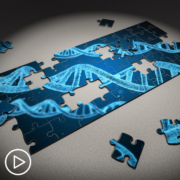What’s the Difference Between Germline and Somatic Breast Cancer Mutations?
What’s the Difference Between Germline and Somatic Breast Cancer Mutations? from Patient Empowerment Network on Vimeo.
Breast cancer expert Dr. Jame Abraham reviews the key differences between germline and somatic genomic testing and explains the role they play in treatment, care, and predicting a recurrence.
Dr. Jame Abraham is the chairman of the Department of Hematology & Medical Oncology at Cleveland Clinic and professor of medicine at Cleveland Clinic Lerner College of Medicine. Learn more about Dr. Abraham.
See More From INSIST! Metastatic Breast Cancer
Related Resources:

What Do You Need to Know About Breast Cancer Genetic Testing? |

|

|
Transcript:
Katherine:
Dr. Abraham, what’s the difference between germline and somatic genetic mutations?
Dr. Abraham:
Sure. So, germline, as I said, to see if we carry that gene, and it means, I’m born with that. I’m inherited. I carry that gene. That’s in my DNA. Somatic is, the change is happening within the tumor, within the tumor.
So, it’s kind of – sometimes, it can be acquired. So, let’s just say, if I’m seeing a patient with breast cancer, and then, it can be early stage. So, I’ll kind of say that – let’s just say, if I’m seeing somebody with a stage II breast cancer, we can do a genomic testing of the tumor to identify the risk of recurrence for the next nine years or so. We do that, mainly in what we call as ER-positive, HER2-negative tumors. So, hormone-positive, HER2-negative tumors.
In early-stage setting, we do genomic testing to classify the risk of recurrence. And I found the high risk, or low risk, that’s one. And second, this genomic testing will tell us the benefit from chemotherapy.
So, share prognosis, and treatment decision.
So, the other genomic testing we commonly do is, let’s just say, she has seen somebody who is metastatic, means the cancer already spread to other part of the body. Again, we can do the genomic testing from the tumor, and then, that’ll kind of give us what, the changes happening within the tumor. That’ll help us to identify potential, and what particular targets within the tumor, so that we can treat them with new treatments, or screen them for clinical trials.
And then, some of the new treatments have specific mutations that’ll identify if patients benefit from certain medications. So, the genomic testing will help us to select patients for these new treatments, or even clinical trials.



